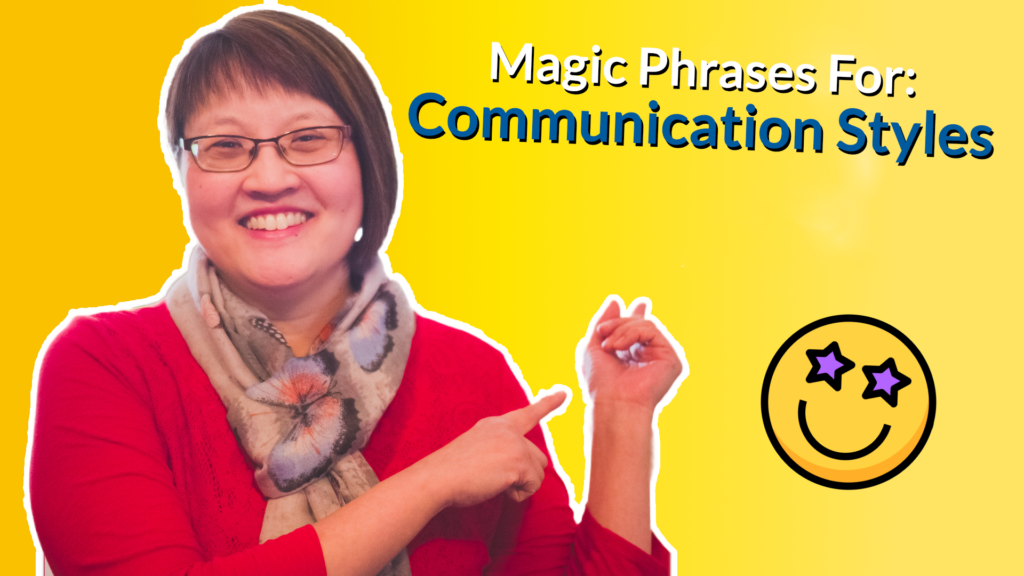Hi there, this is Grace, and welcome to Sensitive Communication Tips.
So in the last video, I talked about how to monitor feelings. And I provided four tips of how to monitor the feelings. I used the acronym MOOD, M for Movement, O for Oh, the look, O for Oh, the face, and D – Declaration, the tone of voice. So today, in this video, we’re going to just do a little bit of a deep dive of MOOD to monitor feelings.
So, again, we’re pretty good about perhaps looking at a general picture of looking at the body movement, or perhaps the eye contact, the facial expressions and the tone of voice. But there could be like minor details that we might miss, like the subtle movement of the body of changing. Like, perhaps the arms were open, and now they’re crossed. Perhaps the eye contact, you know, in some cultures, you know, it’s not good to make eye contact, it’s disrespectful in some cultures to make eye contact, say, with the elders, because of the line of the superiority or the authority figure. And there’s a, an understood, meaning or an understood, what do I want to say, rules of how to interact with our elders.
And then, of course, the facial expression is a little bit hard to see, perhaps that tension in the neck, you know, unless you’re looking really carefully and you see a bit of a tension in the jaw line or in the neck area, if somebody is now displeased with the information that is being shared, or they’re feeling a little bit discomfort with it. And then the tone of voice. Some people even though they may be upset with what is being said, or what they hear, they are still able to keep their tone of voice in a neutral position, they don’t necessarily show their displeasure.
So it’s these little minor details that can kind of make it a little bit challenging to decide if the person all of a sudden is reacting to what is being said. And now, because of what they’ve heard. Now the mood has shifted for them, as far as, you know, how they’re now engaging, in the conversation. So some of this takes practice, and also knowing who you are speaking to. So, you know, the more you know that person who you are speaking to, then you perhaps can read their body language a little bit easier, you can tell a little bit more about how they’re looking at you, or the subtle tone of voice. You– Because you know that person, well, you may be able to pick up some of these minor details better because of having all the experience with that person. So it might be easier to detect the mood of the person when you know them well.
And then you know, the person that you are– who you’re speaking to who don’t know, you, or the person who’s speaking to you may not know you, well, may might not be able to pick up some of these subtle changes in order to monitor the mood or monitor the feelings in the conversation. However, we have instinct, you know, we are very good at sometimes at picking up instinct. And we might have some intuition, like something may not be right. So if your gut is telling you something where you have that instinct, like, you know, I feel like something might be off, you’re probably right. I’m going to say 99 Perhaps 100% of the time you are— you’re probably right if you suspect or you have that gut feeling like something has changed.
So if something you feel is off, you know, don’t be afraid to address it. Say, you know, I feel like all of a sudden if something is not quite right, did I say something wrong? Or, you know, can– you know, something is just different. So, you know, sometimes if you just point it out like, you know, I feel like something has changed, you know, was it something I said or, you know, has something been picked up wrong, you know, and the person might feel okay to share it and they might just say no, everything is fine. But you can sense that something is not. So you can either try to pursue it if you want, or if it’s not that important, you can just drop it and then perhaps just move on to a different topic. Right?
So with conversation, you know, the tricky part of it is sometimes when the mood changes, and it could be changed for the positive, right, if you’re having a serious discussion and everything, and somebody always has some say– says something, and it makes it light hearted, where maybe you laugh, or the group laughs or something, and then everybody starts to relax. And all of a sudden, what became really serious, rigid, now becomes more relaxed, more friendly. And then the other way, it can also happen where everybody was relaxed, and somebody said something, and now all of a sudden, it changed. And now the dynamic of the group, or the dynamic of the conversation with that person now has altered to something perhaps more rigid.
And again, it just depends on how well you know the person how comfortable you are, and just addressing it, and trying then to move on, or is it better sometimes just to say it, but it’s not that important that we can drop it, and then, you know, move on to something else, so that we can always try to have that effective and effortless communication. So that’s my take on monitoring feelings in the conversation. However, you might have your own strategies. And if you do, I would love for you to share what you do, and what helps you to monitor your feelings. Because, again, you know, it’d be great if all of us worked together, and working on having more effective and effortless communication. So that way, we all can have a more positive experience in conversation and communication. It’d be great if we can create a more positive and effortless communication and effective communication and conversations in our lives. And so that we are creating a more positive outcome, rather than having a conflict and also having ways to resolve the conflicts.
So again, if you found this to be helpful, please feel free to visit my website at GraceSOULutions.com That’s GraceSOULutions.com. To see about how you can book a FREE Communication Breakthrough Session with me. Again, I’m here to help all the introverted, sensitive, conflict-phobic women to be able to communicate effortlessly and effectively in their communication so that you are more confident in sharing your message so that you are heard, seen and recognized and be able to repair any communication breakdown.
Thank you for being here. Take care, and I’ll see you here next time. Bye for now!
If you are driven to communicate with confidence, have your messages, be heard and understood, and repair any communication breakdown in your personal communication relationship, then Contact me here and I’ll get you started on the right path.
Warm regards,
Grace CW Liu
Communication Navigator
W: GraceSOULutions.com
ABOUT GRACE
Grace CW Liu believes there is a solution to every problem including communication and conversation problems. Everyone can find the solution they seek by using the guidance of grace that is in you, with the grace of spiritual support, and Grace –me– as your Communication Navigator and support system.
My passion is to help sensitive, conflict-phobic, and introverted women have effective communication so they feel valued and heard in any conversation.
Through studying and observations, I’ve realized why communication breakdown occurs and the solutions to solving those problems. I’ve presented these solutions so that communicative partners can achieve effective communication!





